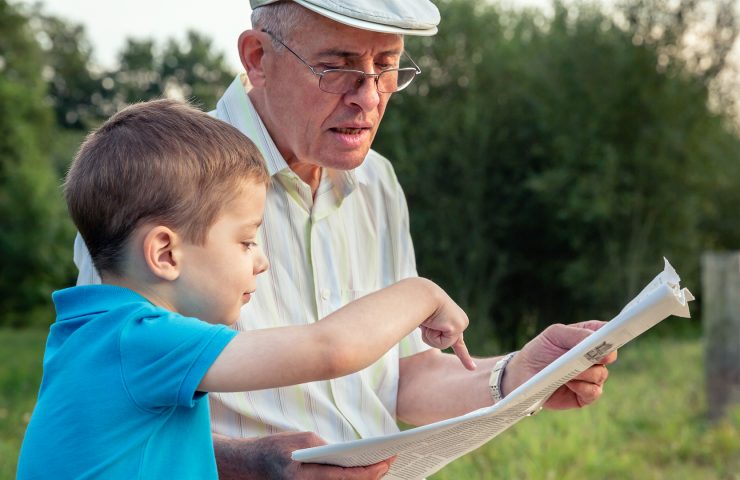
I admit I’m OK with technology, but it’s not my strong point. My partner gets frustrated with me and my grown-up children expect to get a phone call every now and then with “how do I…?” or “what’s happened to my…?” and the occasional “I hate technology!” as I struggle to manage the seemingly endless issues that arise as I use the greatest tool ever invented for work and communication. So, when my grandchildren visit, I am delighted to play with anything other than my computer. However, I do worry that I should embrace the modern way of playing with screen-based games and activities. Thank goodness that the research shows that I’m actually doing my grandchildren a favour when I play with them in the ‘old fashioned way’!
Actively playing with your grandchildren builds brains that are better ready for learning and life, and here’s why:
- When you talk, laugh, sing and communicate with your grandchild face-to-face, the brain receives far more stimulation than when a child plays a game or watches a show on a screen.
Expensive screen-based and electronic toys are often advertised as ‘educational’ for developing minds, however, several studies have found they actually have the opposite effect. There is far less communication between the child and carer, which means less talking, fewer questions, explanations and interactions. All important for building language, curiosity, imagination and thinking skills.
- When young children spend many hours on screens, they risk becoming ‘short sighted’ and needing glasses before they are eight years old. Human eyes need to have many hours of long-distance practise and exposure to sunlight to mature and be healthy. The muscles of the eyes also need to strengthen by moving up and down, around and across. When using a screen, eyes barely move, but the eyes move a lot when the child is actively playing. Outside play is best of all as the eyes can practise both short and long-distance focusing while being exposed to sunlight.
- Reading out loud to young children not only exposes them to sounds of a language, it also helps build imagination. Early books have lots of pictures and very few words, but as a child repeatedly sees, hears and learns the meaning of words they don’t need the images to provide them with an illustration of what the words mean. Gradually, over time, children learn to visualise, or ‘see in their minds’ eye’ pictures of their own making. This is very important for learning at school, be it literacy or numeracy skills. To comprehend what is being read, children must be able to visualise an image of the meaning of the written words. A child who has good visualisation skills will also find it easier to understand maths concepts. In stark contrast, when a child watches and listens to a story on a screen, the images, words and pictures ‘spoon feed’ the story to the child. Imagination or thought processes to follow the storyline or interpret it are not required, so there is little mental stimulation. In the long term, a child struggles to develop their own ideas and to critically think about what they are reading… an essential skill in today’s world of fake news and inaccurate online resources. Reading aloud to children is therefore incredibly important and something that can be started from birth.
- Too much screen time can impact on social skill development and making friends once at school. To communicate well with others, children need to learn to read nonverbal cues as well as understand verbal cues. Facial expression, tone of voice and body position are just some of the non-verbal cues that tell a child many things about what is being said. A school-aged child who does not understand these cues, will find making friends more difficult. Screens don’t provide any practice in reading non-verbal cues, in reading situations or getting a good feel for people. Face-to-face communication, even if via a technology aid is far superior in helping your grandchild develop emotional and social skills.
- Screens can be likened to a drug of addiction. The instant gratification a child receives when tapping or swiping elicits a response of colours, shapes and sounds that can only be found on a screen. This instant success feeds the reward system of the brain and floods the body with a ‘feel good’ hormone called dopamine and when a child gets used to the immediate gratification of a screen response, they will prefer this to other relationships.
Like most things, a little bit of screen time every now and again for the over 2-year-old is OK, but more time is problematic. When I see babies and toddlers in prams that have screens strapped to where they can watch it, I wonder and worry about their future. When out and about in a pram, there is SO much to see, learn and understand and there are SO many opportunities to stimulate those developing brains to be ready for learning at school, to be able to socially engage and to be emotionally stable. The screen has become the ultimate, cheap, baby-sitter. Yes, it’s hard raising children and everyone needs a break, or at least a time in the day when there are fewer demands, so the temptation to turn on a screen is hard to resist. But, for the sake of children’s long-term wellbeing, resist we must. Time to break out those old-fashioned games! Blocks, posting boxes, dress-ups, playdough, paints, storybooks, music… Anyone like to join me?
